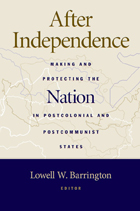
"Where do nationalists go once they get what they want? We know rather little about how nationalist movements transform themselves into the governments of new states, or how they can become opponents of new regimes that, in their view, have not taken the self-determination drive far enough. This stellar collection contributes not only to comparative theorizing on nationalist movements, but also deepens our understanding of the contentious politics of nationalism's ultimate product--new countries."
--Charles King, Chair of the Faculty and Ion Ratiu Associate Professor, Georgetown University School of Foreign Service
"This well-integrated volume analyzes two important variants of nationalism-postcolonial and postcommunist-in a sober, lucid way and will benefit students and scholars alike."
--Zvi Gitelman, University of Michigan
Lowell W. Barrington is Associate Professor of Political Science, Marquette University.

Throughout human history people have been driven from their homes by wars, unjust treatment, earthquakes, and hurricanes. The reality of forced migration is not new, nor is awareness of the suffering of the displaced a recent discovery. The United Nations High Commissioner for Refugees estimates that at the end of 2007 there were 67 million persons in the world who had been forcibly displaced from their homes—including more than 16 million people who had to flee across an international border for fear of being persecuted due to race, religion, nationality, social group, or political opinion.
Driven from Home advances the discussion on how best to protect and assist the growing number of persons who have been forced from their homes and proposes a human rights framework to guide political and policy responses to forced migration. This thought-provoking volume brings together contributors from several disciplines, including international affairs, law, ethics, economics, and theology, to advocate for better responses to protect the global community’s most vulnerable citizens.
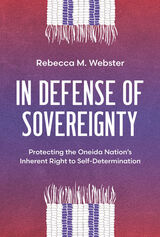
As in so many conflicts between Indigenous nations and local municipalities, the media narrative about the Oneida Nation’s battle for sovereignty has been dominated by the local government’s standpoint. In Defense of Sovereignty offers another perspective, that of a nation citizen directly involved in the litigation, augmented by contributions from historians, attorneys, and a retired nation employee. It makes an important contribution to public debates about the inherent right of Indigenous nations to continue to exist and exercise self-governance within their territories without being challenged at every turn.
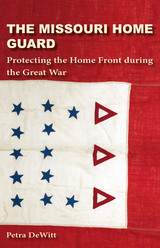
The Home Guard also functioned to preserve patriotism and reduce opposition to the war. Service in the Guard was a way to show loyalty to one’s country, particularly for German Americans, who were frequently under suspicion as untrustworthy. Many German Americans in Missouri enthusiastically signed up to dispel any whispers of treason, while others found themselves torn between the motherland and their new homeland. Men too old or exempt from the draft for other reasons found meaning in helping with the war effort through the Home Guard while also garnering respect from the community. For similar reasons, women attempted to join the organization as did African Americans, some of whom formed units of a “Negro Home Guard.” Informed by the dynamics of race, gender, and ethnicity, DeWitt’s consideration of this understudied but important organization examines the fluctuating definition of patriotism and the very real question of who did and who did not have the privilege of citizenship and acceptance in society.
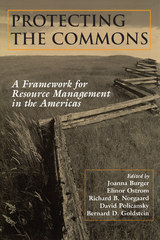
Commons—lands, waters, and resources that are not legally owned and controlled by a single private entity, such as ocean and coastal areas, the atmosphere, public lands, freshwater aquifers, and migratory species—are an increasingly contentious issue in resource management and international affairs.
Protecting the Commons provides an important analytical framework for understanding commons issues and for designing policies to deal with them. The product of a symposium convened by the Scientific Committee on Problems of the Environment (SCOPE) to mark the 30th anniversary of Garrett Hardin's seminal essay “The Tragedy of the Commons” the book brings together leading scholars and researchers on commons issues to offer both conceptual background and analysis of the evolving scientific understanding on commons resources. The book:
- gives a concise update on commons use and scholarship
- offers eleven case studies of commons, examined through the lens provided by leading commons theorist Elinor Ostrom
- provides a review of tools such as Geographic Information Systems that are useful for decision-making
- examines environmental justice issues relevant to commons
Contributors include Alpina Begossi, William Blomquist, Joanna Burger, Tim Clark, Clark Gibson, Michael Gelobter, Michael Gochfeld, Bonnie McCay, Pamela Matson, Richard Norgaard, Elinor Ostrom, David Policansky, Jeffrey Richey, Jose Sarukhan, and Edella Schlager.
Protecting the Commons represents a landmark study of commons issues that offers analysis and background from economic, legal, social, political, geological, and biological perspectives. It will be essential reading for anyone concerned with commons and commons resources, including students and scholars of environmental policy and economics, public health, international affairs, and related fields.
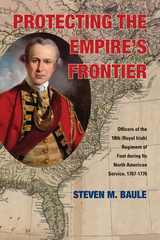
Protecting the Empire’s Frontier tells stories of the roughly eighty officers who served in the 18th (Royal Irish) Regiment of Foot, which served British interests in America during the crucial period from 1767 through 1776. The Royal Irish was one of the most wide-ranging regiments in America, with companies serving on the Illinois frontier, at Fort Pitt, and in Boston, New York, and Philadelphia, with some companies taken as far afield as Florida, Spanish Louisiana, and present-day Maine. When the regiment was returned to England in 1776, some of the officers remained in America on staff assignments. Others joined provincial regiments, and a few joined the American revolutionary army, taking up arms against their king and former colleagues.
Using a wide range of archival resources previously untapped by scholars, the text goes beyond just these officers’ service in the regiment and tells the story of the men who included governors, a college president, land speculators, physicians, and officers in many other British regular and provincial regiments. Included in these ranks were an Irishman who would serve in the U.S. Congress and as an American general at Yorktown; a landed aristocrat who represented Bath as a member of Parliament; and a naval surgeon on the ship transporting Benjamin Franklin to France. This is the history of the American Revolutionary period from a most gripping and everyday perspective.
An epilogue covers the Royal Irish’s history after returning to England and its part in defending against both the Franco-Spanish invasion attempt and the Gordon Rioters. With an essay on sources and a complete bibliography, this is a treat for professional and amateur historians alike.

A conservation easement is a legal agreement between a property owner and a conservation organization, generally a private nonprofit land trust, that restricts the type and amount of development that can be undertaken on that property. Conservation easements protect land for future generations while allowing owners to retain property rights, at the same time providing them with significant tax benefits. Conservation easements are among the fastest growing methods of land preservation in the United States today.
Protecting the Land provides a thoughtful examination of land trusts and how they function, and a comprehensive look at the past and future of conservation easements. The book:
- provides a geographical and historical overview of the role of conservation easements
- analyzes relevant legislation and its role in achieving community conservation goals
- examines innovative ways in which conservation easements have been used around the country
- considers the links between social and economic values and land conservation
Contributors, including noted tax attorney and land preservation expert Stephen Small, Colorado's leading land preservation attorney Bill Silberstein, and Maine Coast Heritage Trust's general counsel Karin Marchetti, describe and analyze the present status of easement law. Sharing their unique perspectives, experts including author and professor of geography Jack Wright, Dennis Collins of the Wildlands Conservancy, and Chuck Roe of the Conservation Trust of North Carolina offer case studies that demonstrate the flexibility and diversity of conservation easements. Protecting the Land offers a valuable overview of the history and use of conservation easements and the evolution of easement-enabling legislation for professionals and citizens working with local and national land trusts, legal advisors, planners, public officials, natural resource mangers, policymakers, and students of planning and conservation.
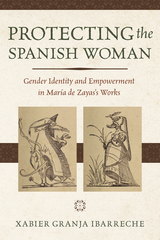
María de Zayas is unique in the seventeenth century as the only Spanish woman to write a collection of exemplary novels whose quality is often compared to Miguel de Cervantes’ masterful works. Her two main collections of short stories, Novelas amorosas y ejemplares and Desengaños amorosos, encompass a social critique based on literary fiction that exposes flaws in the idealized archetypes of masculine identity in early modern Spain. Zayas’s stories redefine women’s patriarchal disadvantage as a tool to expose the ways in which early modern Spanish women could be empowered to counteract men’s discursive and political authority, which they use to unfairly maintain their own social privilege.
Xabier Granja Ibarreche explores how Zayas defies Spanish hegemony by manipulating and transforming the ideals of courtly masculinity that had been popularized by conduct manuals and the traits they specified for appropriate noble comportment. In doing so, Zayas elaborates a nonofficial discourse throughout plots that subvert patriarchal hierarchies: she rearticulates the existing ideological order to empower women who are no longer willing to remain silent and oppressed by masculine domination after centuries of failing to attain a sufficiently self-sufficient political position to ascend in the social hierarchy. By inverting the male gaze that assumes masculinity as a preeminent identity, Zayas subverts the patriarchal subject/masculine, object/feminine order and destabilizes manly superiority as a basic universal reality, thereby empowering and unshackling Spanish women to liberate Iberian culture from the repressive and pernicious future she forebodes.
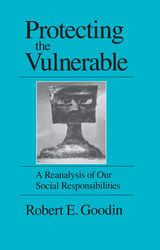

Protecting the Wild offers a spirited argument for the robust protection of the natural world. In it, experts from five continents reaffirm that parks, wilderness areas, and other reserves are an indispensable—albeit insufficient—means to sustain species, subspecies, key habitats, ecological processes, and evolutionary potential. Using case studies from around the globe, they present evidence that terrestrial and marine protected areas are crucial for biodiversity and human well-being alike, vital to countering anthropogenic extinctions and climate change.
A companion volume to Keeping the Wild: Against the Domestication of Earth, Protecting the Wild provides a necessary addition to the conversation about the future of conservation in the so-called Anthropocene, one that will be useful for academics, policymakers, and conservation practitioners at all levels, from local land trusts to international NGOs.

Contract management is a critical skill for all contemporary public managers. As more government duties are contracted out, managers must learn to coordinate and measure the performance of private contractors, and to write contract requirements and elicit bids that obtain important services and products at the best possible price and quality. They must also learn to work in teams that include both public and private sector partners.
The Responsible Contract Manager delves into the issues of how to ensure that the work done by private sector contractors serves the public interest and argues for the necessity of making these organizations act as extensions of the public sector while maintaining their private character. Government contract managers have a unique burden because they must develop practices that ensure the production advantages of networked organizations and the transparency and accountability required of the public sector.
The Responsible Contract Manager fills a major gap in public management literature by providing a clear and practical introduction to the best practices of contract management and also includes a discussion of public ethics, governance and representation theory. It is an essential guide for all public management scholars and is especially useful for students in MPA graduate programs and related fields.

Written by two leading conservation biologists, Saving Nature's Legacy is a thorough and readable introduction to issues of land management and conservation biology. It presents a broad, land-based approach to biodiversity conservation in the United States, with the authors succinctly translating principles, techniques, and findings of the ecological sciences into an accessible and practical plan for action.
After laying the groundwork for biodiversity conservation -- what biodiversity is, why it is important, its status in North America -- Noss and Cooperrider consider the strengths and limitations of past and current approaches to land management. They then present the framework for a bold new strategy, with explicit guidelines on:
- inventorying biodiversity
- selecting areas for protection
- designing regional and continental reserve networks
- establishing monitoring programs
- setting priorities for getting the job done
READERS
Browse our collection.
PUBLISHERS
See BiblioVault's publisher services.
STUDENT SERVICES
Files for college accessibility offices.
UChicago Accessibility Resources
home | accessibility | search | about | contact us
BiblioVault ® 2001 - 2024
The University of Chicago Press









